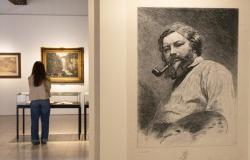
Coldplay frontman Chris Martin personally invited the increasingly popular Romanian musician Babasha for a duet in front of thousands at the National Arena in Bucharest on Wednesday. Neither expected the crowd to react with such fury.
ADVERTISEMENT
When the Romanian singer Babasha took the stage in Bucharest on Wednesday evening, in front of 50,000 people, for a performance with Coldplayhe felt like his dreams had come true.
Then the boos came.
Chris Martinthe leader of the group, had personally invited the increasingly popular Romanian musician, for a duet in front of thousands of people gathered in the national arena. Neither of them expected to have to contend with a ruckus so loud you could barely hear them sing.
“I expected the audience to be divided, but not to be this bad” Babasha, whose songs have been viewed millions of times on YouTube, said in a post on TikTok after the incident.
The problem, according to Babasha, is that it is Rome – member of the largest and most marginalized minority in Europe – and that the manelethe kind of music he performs, is denigrated by many in Romania as the music of the lower classes and the criminal underworld.
“For those who don’t understand, manele is only infamous because of racism, not because of the music itself.”explains Babasha.
A centuries-old genre awakens the ghosts of racism
THE manele mixes folk music with modern electronic sounds, in a way that is not far removed from turbofolkpopular in neighboring Serbia, from skiladiko Greek or chalga Bulgarian.
However, unlike turbofolk, which only became popular in the 1990s, manele, performed mainly by Roma artists, has a much longer history and is deeply rooted in the traditions of the Roma community. In fact, the classic manele dates back to the end of the 18th centurywhen it was introduced to Romania as dance music by Roma from Istanbul.
However, his detractors still deride him today because of his allegedly foul language and banal words, with intolerance going so far as to ban the manele in public spaces in some Romanian cities.
In March 2010, the municipal council of Cluj notably banned taxi drivers from listening to the genre in the course of their work, while the same rule was applied to Galati against its public transport operators in May of the same year.
Experts attribute this resistance to the same reasons that motivated the rejection of the rap or reggaetongenres today considered mainstream but launched by disadvantaged groups.
The persistent rejection of the manele is one of the widespread racist prejudice against Roma.
What happened at Coldplay’s concert on Wednesday “was not just protests, but an outpouring of repressed hatred” said journalist Cătălin Striblea in a Facebook post on Wednesday, stressing that he was stunned that the otherwise progressive public, attracted to the British group, reacted with so much gall.
“It felt like you could cut it with a knife at one point. It was palpable” he explained in the now viral post – a sentiment shared by Željko Jovanović, one of Europe’s most prominent Roma rights activists and president of the European Roma Foundation.
“It’s not really news in Romania”he told Euronews. “Several years ago, Madonna gave a concert in Romania, and she chose to speak out against anti-Roma discrimination, and Madonna was booed.”
But why is this European country so sensitive to racism against the Roma?
Centuries of contempt for human beings
“Romania is the only country in Europe that has treated Roma people as slaves. There is a 500-year history of Roma slavery in Romania,” explains Jovanović. “The population has this historical memory of the Roma who are less than humans or less than citizens.”
And although ordinary people may appreciate manele and musicians like Babasha privately, centuries of negative feelings and little political will for change have meant that Anti-Roma rhetoric has become an all-too-easy way for politicians to enrage the public and score political pointssaid Jovanović.
“In Romania, there were several cases of political initiatives to rename Roma, because Romanians were unhappy that the Roma community and Romania were often confused abroad. So they wanted to change the official name of Roma to a historically derogatory term.”
Meanwhile, the situation of Roma in Europe continues to deteriorate, and not only in Romania.
“The data shows that the devastation is such that the level of unemployment, and even the level of access to clean water and sanitation, are worse than in regions like sub-Saharan Africa or South Asia“, added Mr. Jovanović.
While some have denounced the mistreatment of Roma in Europe, Mr. Jovanović believes that many others abstain for fear of the majority. Still, he hopes things will improve.
“If you look at the history of similar situations around the world, the first thing to recognize is that this is a long battle. Second, there needs to be political organization and political power among the Roma.”
“Third, you need friends who support you in the media, the political sphere and the economic sphere and who have influence on public institutions to help them understand that they must reshape schools, universities and the media in a different way – places where public opinion is formed.
“Without this coalition, this will only continue further, and the situation will become even more dangerous“, concludes Jovanović.
“Boo even louder”
In the meantime, several notable Romanian recording artists have come to Babasha’s defense.
“Well done, man. Singing like you did in front of a stadium booing you is so f*cking rock’n’roll that it can’t be bad. I even envy you for not being in your place, for bathing in this ocean of hypocrisy“, said rock musician Adrian Despot of Vița de Vie in a post on Facebook.
“I found the idea very courageous and magnificent because it is about acceptance, about inclusion, about recognizing that every artist, every musical genre must be respected” pop star Loredana Groza told national media outlet Observator Press.
Finally, on the second evening of the rock band’s back-to-back concerts in Bucharest, Martin opened the concert by saying “shocked, sad and angry”.
“People should be treated equally, and that is what Romanians deserve,” he said Thursday, asking the audience to boo him and “boo better” than the day before.
He then brought Babasha back and, this time, the audience danced, before applauding the Romanian artist for a long time.
Despite his disappointment at the lack of respect and appreciation from the Bucharest crowd on Wednesday, Babasha did not seem discouraged.
“Regardless of all the booing in the world, I would have still accepted (Coldplay’s invitation) because something like that only happens once in a lifetime.”he said on TikTok.
“I’m just a 22-year-old young man who works day and night to make his dream come true, it doesn’t matter if I sing Manele.”





